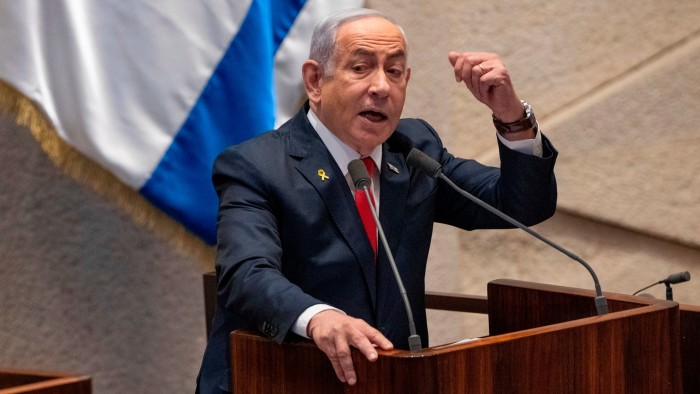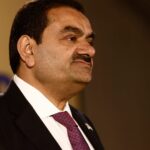The International Criminal Court has issued arrest warrants for Israeli Prime Minister Benjamin Netanyahu and former defense minister Yoav Gallant “for crimes against humanity and war crimes”.
The move is a dramatic escalation of the legal process over Israel’s attack on Gaza, and is the first sign that the court, which was established in 2002, has issued a warrant for the western-backed leader.
This means that the ICC’s 124 member states – which include most European and Latin American countries and many in Africa and Asia – will be required to arrest Netanyahu and Gallant if they enter the region. But the court has no way of enforcing the warrant otherwise.
The warrant, however, will reinforce the sense that Israel has become increasingly isolated internationally through the conduct of war against Hamas in the besieged Gaza Strip.
Announcing the decision on Thursday, the court said there are “reasonable grounds” to believe that Netanyahu and Gallant are criminally responsible for “the war crime of starvation as a method of war; and crimes against humanity, namely murder, torture, and other inhuman acts”.
It said there are also reasonable grounds to believe that the couple is criminally responsible “for the war crime of deliberately targeting the civilian population”, and “deliberately and intentionally denying” food, water, medical supplies, fuel and fuel to Gaza’s civilians. . electric.
The court added that it had decided unanimously to reject Israel’s appeal to the jurisdiction of the ICC. Neither Israel nor the US’s biggest ally is a member of the court.
The Israeli Prime Minister’s Office branded the decision to issue the warrant “anti-Semitic” and said Israel “rejects with disgust the absurd and false actions and charges against it”, calling the ICC “biased and discriminatory political body”.
“No anti-Israel resolution will prevent the state of Israel from protecting its citizens,” he said. “Prime Minister Benjamin Netanyahu will not give in to pressure, will not back down and will not back down until all the war goals set by Israel at the beginning of the campaign are met.”
Netanyahu’s political opponents also condemned the move, with Yair Lapid, head of the largest opposition group, Yesh Atid, calling the warrant “a reward for terrorism”.
Palestinian officials welcomed the ICC’s announcement. Husam Zomlot, the Palestinian ambassador to the UK, said the warrant was “not only a step towards accountability and justice in Palestine but also a step towards restoring the credibility of the rules-based international order”. Hamas asked the court to expand the warrant to cover other Israeli officials.


The court also issued an arrest warrant for Hamas leader Mohammed Deif for crimes against humanity and war crimes for the militant group’s October 7, 2023 attack on Israel that sparked the war in Gaza. Israel said in August it had killed Deif in an airstrike in Gaza the previous month.
The warrant caused mixed international reaction. In the US, figures from the Biden White House and the incoming Republican administration condemned the court’s move.
The White House said it “fundamentally rejects” the ICC decision.
“We remain deeply concerned by the prosecutor’s rush to seek arrest warrants and troubling process errors that led to this decision,” said the US National Security Council.
Mike Waltz, who will be national security adviser when the administration of Donald Trump takes office in the US next year, said the ICC “lacks credibility” and “these allegations have been denied by the US government”.
“You can expect a strong response to antisemitic bias from the ICC and the UN come January,” he wrote in X.
However, the EU’s top diplomat, Josep Borrell, said the warrant was not political, and that the court’s decision should be respected and implemented.
ICC prosecutor Karim Khan initially sought warrants in May for Netanyahu, Gallant, Deif and two other Hamas leaders, Yahya Sinwar and Ismail Haniyeh, both of whom Israel has killed.
The ICC’s move comes as Israel faces intense criticism over the casualties of the attacks in Gaza, which have led to a humanitarian disaster in the region.
The hostilities began when Hamas militants invaded Israel in October last year, attacking communities in the country’s south, killing 1,200 people, according to Israeli officials, and taking another 250 hostage.
In response, Israel launched a ferocious attack on Gaza, with Gallant declaring a “complete siege” of the strip. The Israeli offensive has so far killed nearly 44,000 people, according to Palestinian officials, as well as displaced 1.9 million of the enclave’s 2.3 million residents and reduced much of it to rubble.
The UN and aid agencies have repeatedly criticized Israel for restricting aid deliveries to the strip, while warning of the threat of famine and disease outbreaks.
The fighting also led to legal proceedings at the International Court of Justice, which deals with cases against states, rather than individuals.
The court, the highest in the UN system, is hearing a case brought by South Africa accusing Israel of genocide against Palestinians in Gaza. Israel has strongly denied the allegations.




